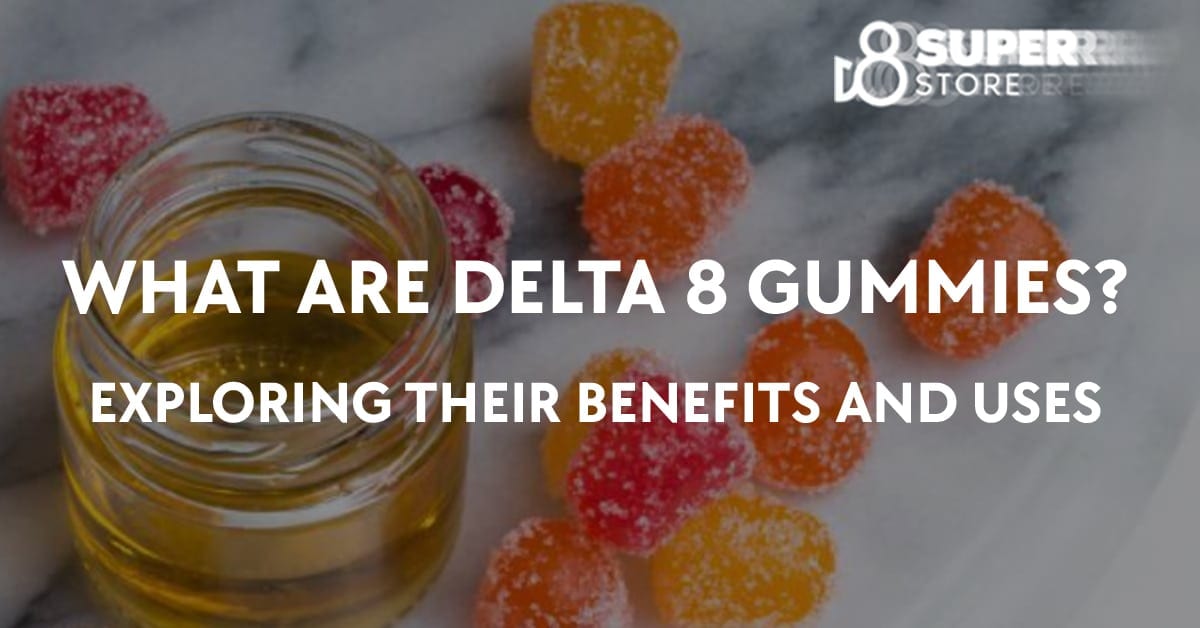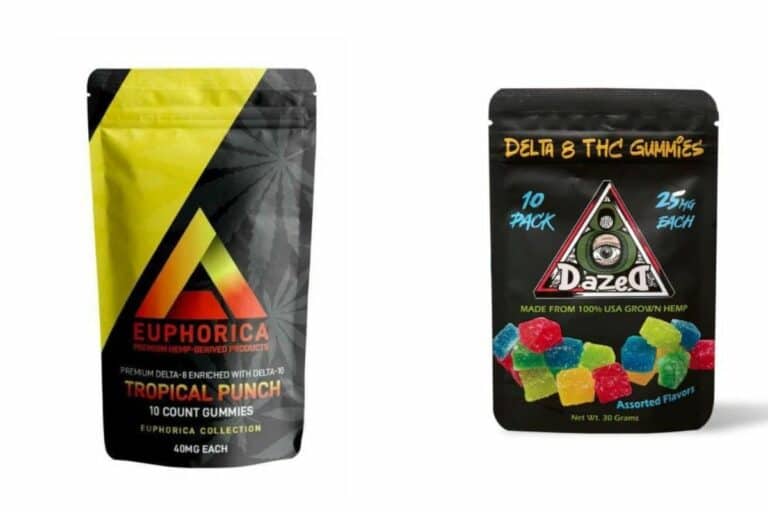What are Delta 8 Gummies? Exploring Their Benefits and Uses
Hit a snag? Shoot us a swift message with: “Oops, looks like a hiccup. Can’t deal with it right now.”
Delta-8 gummies have gained popularity as an ingestible form of Delta-8 THC (tetrahydrocannabinol), a compound originating from the cannabis plant. These gummies are infused with Delta-8 THC, making them a legal and regulated substitute for conventional Delta-9 THC products.
Delta-8 THC is known for its milder psychoactive effects and potential therapeutic benefits, making the gummies an attractive choice for those looking to experience the positive aspects of cannabis without the overwhelming effects of Delta-9 THC.
While Delta-8 THC was once a relatively unknown compound, it gained popularity in the realm of cannabis products due to the 2018 Farm Bill, which legalized hemp-derived cannabinoids excluding Delta-9 THC.
This opened doors for the commercialization and consumption of Delta-8 products, including gummies, which often come in various flavors and dosages. It’s essential, however, for consumers to research and be aware of the legality, effects, and safety guidelines associated with Delta-8 gummies.
Key Takeaways
- Delta-8 gummies are infused with a mild psychoactive cannabinoid, offering an alternative to traditional THC products.
- The popularity of these gummies is linked to the 2018 Farm Bill, which legalized most hemp-derived cannabinoids.
- Consumers should be aware of the legality, effects, and safety guidelines associated with Delta-8 THC products.
What Are Delta-8 Gummies?
Delta-8 gummies are edible cannabis products that contain delta-8-tetrahydrocannabinol (delta-8 THC) as their main active ingredient. Delta-8 THC is a naturally occurring compound found in the cannabis plant, and is considered a less potent analogue of the well-known delta-9-tetrahydrocannabinol (delta-9 THC) which is responsible for the high people typically associate with marijuana consumption.
These gummies are designed to offer a milder psychoactive experience compared to traditional marijuana edibles containing delta-9 THC. They come in various flavors, shapes, and sizes, providing users with a tasty and convenient way to consume this cannabinoid. Delta-8 gummies can be made from hemp or marijuana-derived delta-8 THC, depending on the legal status and availability in the respective state or country of sale.
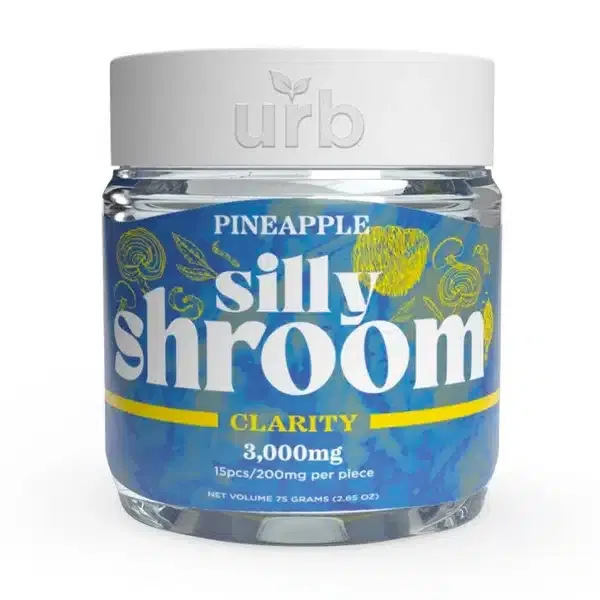
Delta-8 THC gummies are typically made by infusing the isolated delta-8 THC compound into a gelatin or pectin-based candy mix. This mixture is then poured into molds, allowed to set, and eventually coated with sugar or other flavorings to create the final product. Consumption of delta-8 gummies may result in mild euphoria, relaxation, and potentially other benefits in some users.
It is important to note that the effects of delta-8 THC can vary greatly from person to person, with factors such as individual tolerance, metabolism, and weight playing a role in how one experiences delta-8 gummies. Additionally, the dose contained in each gummy can impact the effects and duration of the experience. As with any cannabis product, it is recommended to start with a low dose and slowly adjust to find the most suitable level for individual preferences and needs.
In conclusion, delta-8 gummies are a popular form of edible cannabis product that offers a milder and more controlled psychoactive experience compared to traditional delta-9 THC edibles. They provide users with a discreet and convenient method of consumption, making them an appealing option for those looking to explore the effects of delta-8 THC in a familiar and enjoyable format.
Delta-8 THC: Understanding the Cannabinoid
Delta-8 THC is a naturally occurring cannabinoid found in small amounts in the cannabis plant, often referred to as cannabis sativa. Though it is less abundant than its well-known counterpart, Delta-9 THC, Delta-8 THC has been gaining attention for its purported psychoactive effects and potential medical benefits.
Differences between Delta-8 and Delta-9 THC
Delta-8 THC and Delta-9 THC are both cannabinoids derived from the cannabis plant. They share many similarities, but there are some key differences:
- Chemical Structure: Delta-8 and Delta-9 THC have similar molecular structures, but the placement of a double bond causes a slight difference in their chemical properties. Delta-8 THC has its double bond on the 8th carbon atom in the molecule, while Delta-9 THC has it on the 9th. This structural difference leads to variations in how the two cannabinoids interact with the body’s endocannabinoid system.
- Psychoactive Effects: Both Delta-8 and Delta-9 THC are psychoactive, meaning they can produce a “high.” However, Delta-8 THC is generally considered to have milder effects than Delta-9 THC. Users often report feeling more clear-headed and focused with Delta-8, compared to the potential paranoia and anxiety sometimes associated with Delta-9 THC.
- Availability: Delta-9 THC is mainly found in the flower of the cannabis plant, while Delta-8 THC is typically available in smaller quantities. However, recent advancements in extraction and processing techniques have allowed for the production of Delta-8 THC-enriched products, such as gummies, tinctures, and vape cartridges.
Delta-8 gummies contain the Delta-8 THC cannabinoid, usually extracted from hemp or cannabis plants. They provide a more subtle psychoactive experience compared to Delta-9 THC, which has made them an increasingly popular alternative for those seeking potential stress relief or a mild buzz without the intense effects of traditional cannabis products.
Keep in mind that while many users report positive experiences with Delta-8 THC, research on its effects and potential benefits is still limited. It’s essential to exercise caution and consult with a healthcare professional before trying any new cannabinoid product.
Legality of Delta-8 Gummies

State Regulations
Delta-8 THC is a compound derived from hemp that is gaining popularity due to its mild psychoactive effects. While delta-8 gummies are often marketed alongside CBD products, there is a significant difference in the legal status of these two compounds. The 2018 Farm Bill legalized the cultivation and processing of hemp products in the United States, as long as they contain no more than 0.3% THC by dry weight. As a result, CBD products derived from hemp are federally legal.
However, the legal status of delta-8 gummies varies by state. Despite the 2018 Farm Bill, certain states have specific regulations that classify delta-8 THC as distinct from CBD, resulting in different legal statuses. For example, some states, such as New York, have expressly prohibited the sale of delta-8 THC products, including gummies. Across the country, the legality of delta-8 gummies is complex and subject to change as state governments determine the appropriate classifications and responses.
It is essential for consumers and businesses to understand their state’s regulations and requirements when dealing with delta-8 gummies. In some areas, possession or sale of these products may be illegal, whereas others may place restrictions on advertising, packaging, or distribution. Legal consequences may vary, and responsible parties should seek local guidance when necessary.
At the federal level, the legal status of delta-8 THC is similarly ambiguous. While the compound is derived from hemp, it can still be chemically synthesized from other cannabis plants, potentially classifying it as a controlled substance. Given these complexities, those looking to buy or sell delta-8 gummies should exercise caution and be aware of the ever-changing legal landscape concerning hemp and its derivatives.
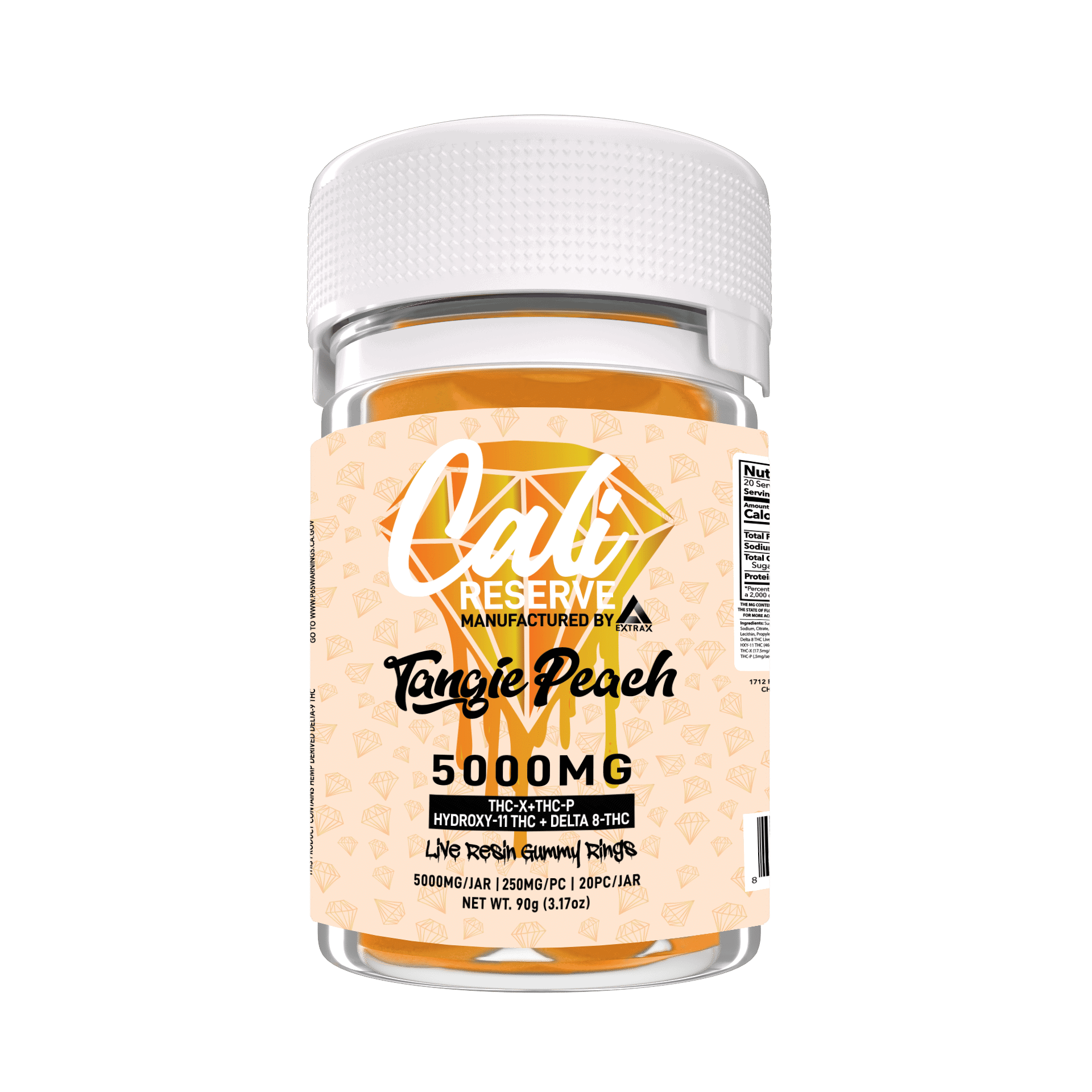
Effects and Benefits
Delta 8 gummies are edible products containing delta-8-tetrahydrocannabinol, a cannabinoid found in the cannabis plant. They have gained popularity for their potential therapeutic effects and relatively mild psychoactive properties compared to delta-9-THC, which is the primary active compound in marijuana.
Potential Side Effects
While delta 8 gummies may offer certain benefits, their consumption may also come with some side effects. These may include:
- Dry mouth: A common side effect reported by users is dry mouth which may cause discomfort.
- Nausea and vomiting: Delta 8 gummies may cause nausea or vomiting in some individuals, especially when consumed in higher doses.
- Hallucinations: Though rare, some users have reported mild hallucinations after ingesting delta 8 gummies.
It is important to note that individual reactions to delta 8 gummies may vary, and the severity of side effects can depend on factors such as potency, dosage, and personal tolerance.
Therapeutic Applications
Delta 8 gummies have been suggested to possess various therapeutic applications, primarily due to their potential interaction with the body’s endocannabinoid system. Some of the potential therapeutic applications include:
- Anxiety and depression: Delta 8 gummies may help alleviate symptoms of anxiety and depression by promoting relaxation and a sense of calmness.
- Pain relief: Delta 8 gummies have been found to possess analgesic properties, which may aid in managing chronic pain.
- Euphoria and mood enhancement: Some users report experiencing a mild sense of euphoria and improved mood after consuming delta 8 gummies.
It is essential to bear in mind that while delta 8 gummies may offer potential benefits, the scientific evidence supporting such claims remains limited. Consultation with a healthcare professional is recommended before using delta 8 gummies to address specific medical conditions.
How Delta-8 Gummies are Made
Delta-8 THC gummies are edible products infused with delta-8 THC, a naturally occurring cannabinoid present in the cannabis plant. Delta-8 THC is closely related to delta-9 THC, the psychoactive component found in marijuana, but offers a milder and legal alternative to delta-9 THC.
Types
Delta-8 THC gummies come in various types. Some products are derived from hemp-derived CBD, while others may incorporate other cannabinoids extracted from the cannabis plant. These gummies cater to a wide range of preferences and dietary restrictions. You’ll find vegan options that use plant-based ingredients and avoid animal-derived gelatin. Many delta-8 gummies are made with organic ingredients, ensuring consumers get high-quality products free from harmful additives or pesticides. Moreover, non-GMO options are available for those who prefer gummies made without genetically modified organisms.
Flavors
These chewy edibles come in a variety of flavors, typically achieved through the use of fruit extracts, natural terpenes, and organic sweeteners. Popular gummy flavors include blue raspberry and watermelon. Terpenes, the aromatic compounds found in the cannabis plant, can also enhance the flavor profile of delta-8 THC gummies, adding depth and complexity to their taste.
Creating delta-8 THC gummies involves mixing delta-8 THC distillate with other ingredients such as sugar, corn syrup, fruit pectin, and various flavorings. The mixture is then poured into gummy molds and allowed to cool and solidify. Once the gummies have reached the desired consistency, they are removed from the molds, packaged, and ready for consumption.
Delta-8 THC gummies offer an enjoyable and convenient way to experience the benefits of cannabinoids in a familiar and delicious form. With numerous types and flavors available, consumers can easily find a delta-8 gummy that suits their preferences and dietary needs.
Usage and Safety Guidelines
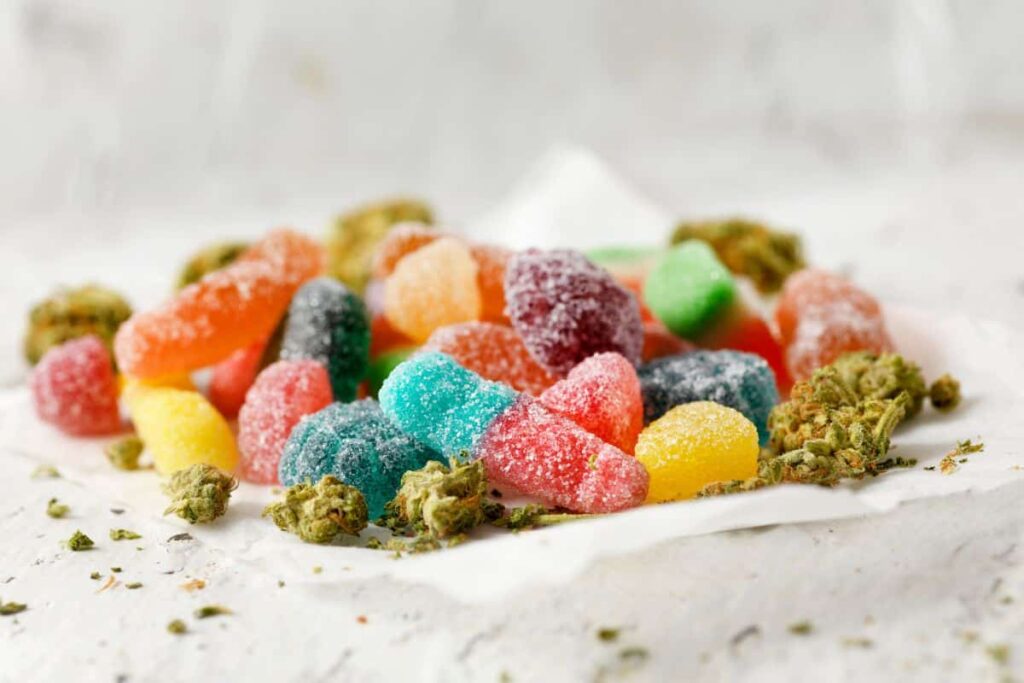
Dosage
When using Delta 8 gummies, it is essential to follow the recommended dosage provided by the manufacturer. Keep in mind that Delta 8 THC has stimulating effects and can impact different people in various ways. Start with a low dosage and gradually increase it if necessary, as exceeding the recommended dose may result in confusion, impairment, loss of coordination, and memory loss.
Precautions
While Delta 8 gummies are intended for consumption, there are some safety concerns to be aware of:
- Appetite: Delta 8 THC can potentially cause an increased appetite in some individuals. Monitor your food intake while using these gummies to avoid overeating.
- Risks: Delta 8 gummies should be used with caution, as they may lead to side effects such as confusion, loss of consciousness, and delayed reaction times.
- Food and Drug Administration (FDA): The FDA does not currently regulate Delta 8 THC products. As a result, it is crucial to carefully research the manufacturer and product before consuming Delta 8 gummies to ensure their quality and safety.
- Contaminants: Ensure the Delta 8 gummies you purchase have been tested for contaminants, such as pesticides or heavy metals, by a third-party lab to ensure they meet public health standards.
- Labeling: Proper labeling on Delta 8 gummies should clearly indicate the product’s potency, intended use, and dosage instructions.
By following these dosage and precaution guidelines, you can enjoy Delta 8 gummies safely while minimizing potential risks to your health.
Delta-8 and Drug Testing
Delta-8 THC is a cannabinoid closely related to Delta-9 THC, the psychoactive compound found in marijuana. It is becoming increasingly popular due to its milder psychoactive effects and relative legality in most states. Delta-8 gummies are edible products that contain Delta-8 THC, providing a convenient and enjoyable way to consume the cannabinoid.
When it comes to drug testing, traditional urine tests designed to detect marijuana use may not accurately identify the presence of Delta-8 THC in the system. These tests typically focus on identifying Delta-9 THC metabolites, and therefore might not be sensitive enough to detect Delta-8 THC consumption (source).
Despite the unique properties of Delta-8 THC, there is still a potential risk of failing a drug test if you consume Delta-8 gummies. Simply put, the chemical structure of Delta-8 THC is similar to that of Delta-9 THC, which may result in cross-reactivity during testing. This means that a drug test could potentially produce a positive result for marijuana use, even if the individual has only consumed Delta-8 THC gummies (source).
To minimize the risk of failing a drug test due to Delta-8 THC gummy consumption, consider the following factors:
- Frequency of use: Occasional users are less likely to test positive than heavy users.
- Dosage: Consuming larger amounts of Delta-8 THC gummies increases the likelihood of a positive test result.
- Individual metabolism: Some people may process cannabinoids faster than others, reducing the time it takes for the compound to become undetectable.
It is crucial to be aware of the potential implications of Delta-8 THC consumption and make informed decisions, especially if you are subject to regular drug testing. Always consider the specific guidelines imposed by your workplace, school, or other organization, and weigh the risks and benefits before consuming Delta-8 gummies.
Popular Delta-8 Products
Delta-8 THC products have become increasingly popular in recent years, thanks to their potential benefits in the endocannabinoid system and legal status as an over-the-counter alternative to delta-9 THC. Delta-8 products come in various forms such as gummies, tinctures, oils, joints, and treats like brownies. They are primarily used for stress relief and relaxation.
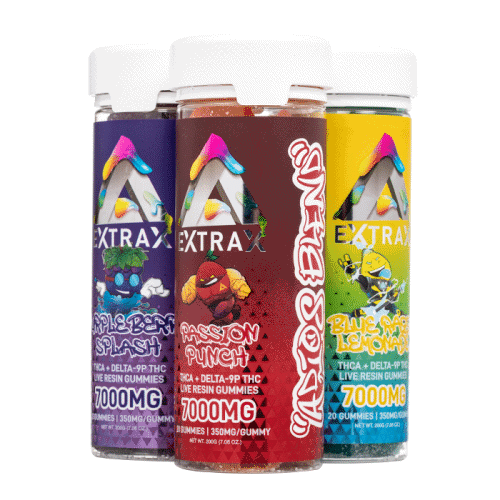
Brands
Several trustworthy brands are making a name for themselves in the delta-8 market, offering an extensive range of products:
- 3Chi: A well-known player in the delta-8 space, 3Chi offers tinctures, gummies, and vape cartridges. Their products are known for their quality and potency.
- Delta Extrax: Specializing in delta-8 and CBN products, Delta Extrax offers gummies, tinctures, and disposable vape pens. They aim to provide users with a unique experience and enhanced effects with consistent dosing.
- MoonWLKR: This brand focuses mostly on delta-8 gummies, offering a diverse range of flavors and strengths. MoonWLKR gummies are known for their quality and taste. They are also available online.
- Medterra: While Medterra is primarily known for its CBD products, they also offer a unique delta-8 THC and True Full Spectrum Original CBD Gummy product that aims to provide an entourage effect, combining the best of delta-8 THC and CBD.
Prices
The pricing of delta-8 products depends on the brand, type of product, and potency. Gummies, which are among the most popular forms of delta-8 consumption, typically range in price from $25 to $60 for a 30-count bottle or package, while oils and tinctures can range from $30 to $80 depending on their concentration.
When shopping for delta-8 products, it is essential to research and compare products to ensure you’re purchasing from a reputable brand and getting the best value for your money. Keep in mind that it is crucial to start with lower dosages to understand your tolerance and comfort before increasing to higher concentrations.
Emerging Cannabinoids and Future Developments
In recent years, the world of cannabinoids has expanded beyond traditional compounds like CBD and THC. One such emerging cannabinoid is delta-8 THC, a compound that has gained significant attention. Delta-8 THC gummies, in particular, are growing in popularity due to their reported milder psychoactive effects compared to delta-9 THC, which is found in marijuana. As a result, they offer a compelling option for those looking for a more subtle experience.
An interesting development for delta-8 THC is its legal status. Derived from hemp (a type of cannabis plant), delta-8 THC falls under the regulatory umbrella of the 2018 Farm Bill, which legalized hemp-derived CBD. This has made the compound accessible to a wider audience due to its semi-legal status in the United States, but regulations still vary by state, and future legal developments may impact its availability.
Scientists are currently exploring other cannabinoids, such as delta-10 THC, for potential therapeutic applications. As research continues, it’s likely that we’ll see a greater understanding of the subtle differences between these various compounds. This ongoing research contributes to the evolving landscape of cannabis products, as both consumers and manufacturers strive to find the perfect balance of effects and benefits.
In conclusion, delta-8 THC gummies represent an exciting development in the ongoing exploration of cannabinoids. Their unique properties and legal status have made them increasingly popular, while the continued study of emerging cannabinoids like delta-10 THC may help shape the future of the cannabis industry. As more research is conducted and new developments arise, it’s crucial to stay informed and make educated decisions about the products we choose to consume.
Frequently Asked Questions
Are Delta 8 gummies safe to consume?
Delta 8 gummies are generally considered safe to consume for adults. They are made from hemp-derived Delta 8 THC, which is legal under the 2018 Farm Bill. However, it is essential to buy from reputable brands that provide third-party lab tests to ensure product safety and quality.
What are the potential side effects of Delta 8 gummies?
Some potential side effects of Delta 8 gummies include drowsiness, dry mouth, and mild changes in appetite. These effects are usually short-lived and can be managed by adjusting the dosage and staying hydrated. It’s crucial to start with a low dose and increase gradually to find the best amount for you.
How do Delta 8 gummies differ from CBD gummies?
Delta 8 gummies contain Delta 8 THC, a psychoactive compound, whereas CBD gummies contain cannabidiol, a non-psychoactive compound. Delta 8 gummies can produce mild, uplifting feelings and a sense of relaxation, while CBD gummies are mainly used for their potential health benefits, such as reducing anxiety and pain.
What are the effects of Delta 8 gummies on mood?
Delta 8 gummies can have a positive impact on mood, as they may help alleviate stress and anxiety. Users have reported feeling relaxed, clear-headed, and more focused after consuming Delta 8 gummies. The experience can be different for each individual, so it’s essential to start with a small dose and monitor your body’s response.
How are Delta 8 gummies produced?
Delta 8 gummies are produced by extracting Delta 8 THC from the hemp plant. The extracted compound is then infused into gummy candies to create an easy-to-consume edible product. The process typically involves purification, testing, and formulation to ensure a consistent and controlled consumption experience.
Do Delta 8 gummies show up on drug tests?
Delta 8 gummies can potentially show up on drug tests, as most tests look for the presence of THC metabolites. Although Delta 8 THC is different from Delta 9 THC (found in marijuana), their chemical similarities might cause a positive result. It’s essential to be aware of this possibility, especially if you are subject to drug testing for work or legal purposes.
Resources:
- https://www.fda.gov/consumers/consumer-updates/5-things-know-about-delta-8-tetrahydrocannabinol-delta-8-thc
- https://www.sciencedirect.com/science/article/pii/S2773021222000220
- https://www.discovermagazine.com/lifestyle/21-best-delta-8-gummies-on-market-in-2023
- https://www.medicalnewstoday.com/articles/325871

